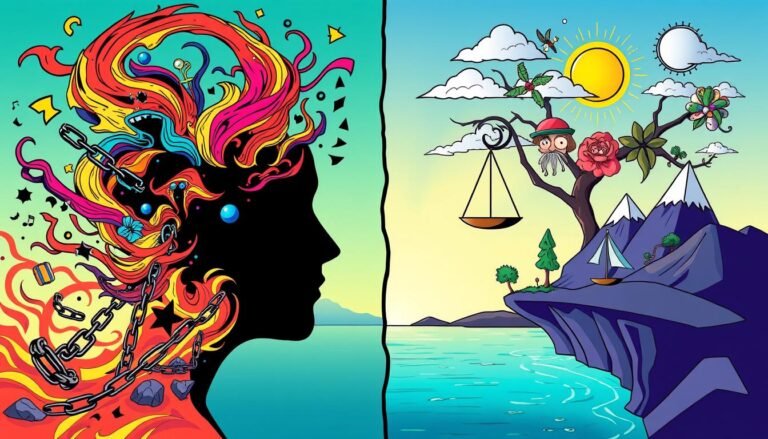Personality and Political Attitudes: What’s the Link?
Imagine you’re at a family dinner, and politics comes up. Your laid-back cousin is talking about liberal policies. Meanwhile, your detail-oriented aunt is pushing for conservative values. It makes you wonder why people with different personalities have different political views.
Research has found interesting links between personality traits and political views. For example, people who are open to new experiences tend to support liberal policies. On the other hand, those who are organized and reliable often lean towards conservative views. But this connection is not as strong.
But here’s something even more fascinating. Research suggests that our political views might start forming early in life. And they might even be influenced by our genes. This changes the idea that our personality just shapes our politics. It shows that our genes, life experiences, and political views are all connected in a complex way.
As we explore this topic further, we’ll look at the Big Five personality model. We’ll see which personality traits are linked to political views. And we’ll understand how both our genes and environment shape our political behavior. You’ll see why you and your family might agree on some things but disagree on others.
Key Takeaways
- Personality traits and political attitudes show significant correlations
- Openness to Experience is linked to liberal views on social issues
- Conscientiousness has a weaker connection to conservative attitudes
- Genetic factors play a role in both personality and political orientations
- The relationship between personality and politics is more complex than previously thought
- Environmental factors also contribute to shaping political views
Understanding Personality Traits and Political Orientations
Personality traits and political views are closely tied. Studies show the Big Five personality traits greatly affect our political leanings. Let’s dive into how these traits shape our political beliefs.
Defining Personality Traits
Personality traits are stable characteristics that guide our behavior. The Big Five model includes openness to experience, conscientiousness, extraversion, agreeableness, and neuroticism. These traits influence how we interact with the world and form our opinions.
Conceptualizing Political Attitudes
Political attitudes reflect our liberal or conservative views on policies. They’re shaped by our experiences, values, and personality. Recent studies show a strong link between personality traits and political ideology.
The Big Five Personality Model
The Big Five model is widely used to study personality and politics. Here’s a breakdown of how these traits relate to political views:
| Personality Trait | Political Orientation | Characteristics |
|---|---|---|
| Openness to Experience | Liberal | Creative, intellectual, open-minded |
| Conscientiousness | Conservative | Organized, responsible, traditional |
| Extraversion | Varies | Outgoing, energetic, assertive |
| Agreeableness | Varies | Cooperative, empathetic, trusting |
| Neuroticism | Varies | Anxious, emotionally unstable, sensitive |
Openness to experience strongly correlates with liberal views. People high in openness tend to be more creative and open to new ideas. Conscientiousness, on the other hand, is linked to conservative attitudes. These traits shape our political beliefs in complex ways.
Understanding these connections helps explain why people hold certain political beliefs. It also sheds light on how personality influences our decision-making in the political arena.
The Assumed Causal Relationship
For a long time, people thought that personality and politics were linked. They believed that our early life traits shape our political views. This idea said that our genes and early life experiences guide our political choices.
But, new studies are changing this view. They found that our political views start in childhood, just like our personality. And, like personality, they are also shaped by our genes. This makes the link between personality and politics more complicated.
A big study with 20,559 people from 5,402 families, including 7,234 twins, sheds light on this. It shows that both personality and political views are influenced by genes. This means that one doesn’t cause the other.
| Factor | Influence on Personality | Influence on Political Attitudes |
|---|---|---|
| Genetic | Strong | Strong |
| Environmental | Moderate | Moderate |
| Developmental Timing | Early Childhood | Childhood |
This study reveals a more complex relationship between personality and politics. It suggests that a common genetic factor influences both. This discovery challenges the old idea and opens up new ways to understand how personality and politics are connected.
Key Personality Traits Linked to Political Attitudes
Research shows strong links between personality and politics. Certain traits are often found in people with specific political views. The Big Five model gives us interesting insights into how our personalities shape our political beliefs.
Openness to Experience and Liberalism
Those who are open to new experiences tend to be more liberal. They are curious, creative, and love trying new things. This openness often leads them to support progressive ideas and social change.
Conscientiousness and Conservatism
Conscientious people usually lean towards conservative views. They value order and discipline. This often means they support traditional values and established social structures.
Other Trait-Attitude Correlations
Research has found connections between personality and politics. For example, those who score high in social dominance orientation often support hierarchical systems. Interestingly, narcissism also affects political views. Entitlement is linked to right-wing views, while exhibitionism is associated with left-wing stances.
| Personality Trait | Political Leaning |
|---|---|
| Openness to Experience | Liberal |
| Conscientiousness | Conservative |
| Entitlement (Narcissism) | Right-wing |
| Exhibitionism (Narcissism) | Left-wing |
These findings show how complex the relationship between personality and politics is. They offer valuable insights into why people vote the way they do and how they engage in politics.
Genetic Influences on Personality and Politics
Behavioral genetics has changed how we see personality traits and political views. Twin studies have shown how genes and environment mix to shape our political beliefs.
Research with over 12,000 twin pairs in five democracies found something interesting. It shows that genes explain 30-60% of our social and political views. This means that personality traits alone don’t decide our political views.
Genes are key in forming our political beliefs, except when we talk about Left-Right. Our political views come from both our genes and our environment.
- Political interest is heritable, with estimates ranging from 0.40 to 0.62
- Personality traits like Openness and Conscientiousness impact interest in politics
- Demographic variables such as age, income, and education correlate with political interest
Even though genes play a big role, they don’t directly cause our political views. Studies show that changes in personality don’t lead to changes in political views. This proves there’s no direct link.
“Hundreds of papers on personality and political traits have been published claiming causality or covariation, creating inconsistencies in empirical results and theoretical foundations.”
To understand this better, researchers suggest looking at it over time. This will help us see how genes, personality, and politics interact and change together.
Personality and Political Attitudes: What’s the Link?
For years, researchers have been curious about the link between personality traits and political attitudes. They’ve found connections, but it’s still unclear if one causes the other.
Correlational Evidence
Studies have shown that personality and politics are connected. For example, being open to new experiences is linked to being liberal. On the other hand, being careful and organized is tied to being conservative. These findings have been cited over 4,000 times since 2003.
Theoretical Justifications
There are theories trying to explain why personality and politics are linked. One idea is that facing political uncertainty makes people fearful. This fear can shape both their personality and political views. This idea fits with research showing social networks greatly influence our behavior and attitudes.
Challenges to the Causal Assumption
Even with connections found, it’s hard to say which one causes the other. A study with 28,877 people found no clear link between personality and politics. Another study followed 7,610 adults and 1,061 teens for ten years. It showed that changes in personality didn’t lead to changes in political views.
These results question the idea that personality and politics are directly linked. It seems they might develop on their own. This mystery keeps researchers in political psychology busy.
The Role of Environmental Factors
Environmental factors shape both personality traits and political attitudes. Recent studies show how our surroundings influence our personality, even in adults. The COVID-19 pandemic offers a unique lens to examine these connections.
During the pandemic, fear and anxiety emerged as key predictors of individual reactions. Neuroticism, linked to worry and anxiety, played a significant role in how people responded to the crisis. Interestingly, political orientation also predicted attitudes towards the pandemic, similar to other crises like climate change.
Social learning and situational influences became evident. Panic buying of essentials like toilet paper and food spread through social networks. Education levels affected how individuals processed information about the virus, highlighting the impact of contextual factors.
An online study in March 2020 used the Ten Item Personality Inventory (TIPI) to measure personality traits. This tool, popular in political science, assesses the “Big Five” dimensions: openness, conscientiousness, extraversion, agreeableness, and emotional stability.
Research suggests a dynamic relationship between personality and political attitudes. Exposure to political environments can alter traits like openness. This challenges the idea of fixed personality traits and underscores the role of external circumstances in shaping both personality and political views.
“Personality traits and political attitudes are not set in stone. They evolve through our experiences and interactions with the world around us.”
These findings highlight the complex interplay between individual dispositions and environmental factors in forming our political beliefs and responses to global events.
Measuring Personality: The Ten Item Personality Inventory (TIPI)
The Ten Item Personality Inventory (TIPI) is a well-known tool for measuring personality. It was introduced in 2003 and is quick to use. It’s especially useful in political science because it’s easy to administer.
Overview of TIPI
TIPI has 10 items, split into five two-item subscales. Each subscale covers a Big Five dimension: extraversion, agreeableness, conscientiousness, emotional stability, and openness. It only takes about a minute to fill out, making it perfect for big studies or when you need to control for personality traits.
Advantages and Limitations
TIPI’s biggest plus is how fast it is. It’s quick to use without losing much accuracy. It’s been translated into 26 languages, helping with research across cultures. But, it’s short, which might make it less reliable than longer tests.
Stability of TIPI Measurements
Research on TIPI’s reliability is promising. It shows good validity and matches up well with longer tests. Its scores seem stable over time, but more study is needed to see how political events might affect them.
| TIPI Characteristic | Description |
|---|---|
| Number of Items | 10 |
| Completion Time | ~1 minute |
| Languages Available | 26+ |
| Citations | 9,500+ |
Implications for Political Science Research
The mix of personality traits and political views changes how we do research in political science. We must be careful when linking personality to political attitudes. This means moving towards long-term studies to see how political behavior changes over time.
Recent studies have broadened our view of political science. A 2018 study found big links between personality and political sides in England. Another 2017 study looked at how personality traits affect economic views.
Using many fields together is key now. By mixing psychology, genetics, and political science, we get a clearer picture of how personality affects politics. This is shown in studies like “Personality Traits and Political Ideology: A First Global Assessment” from 2017.
The field is growing to include new kinds of activism. Studies on protests have become part of political science since the 1960s. But, linking individual psychology to civic actions is still new and needs more study.
“Selling Ourselves Short? How Abbreviated Measures of Personality Change the Way We Think about Personality and Politics” – This 2018 study talks about how short personality tests change our view of politics.
As research in political science grows, we see that understanding political behavior needs both old and new methods. Adding personality studies to political science is a big step towards a deeper understanding of political actions and choices.
Conclusion
The link between personality traits and political views is intriguing. Recent studies question the old idea that personality shapes politics. Long-term studies show that personality changes don’t always lead to political shifts.
This discovery makes us rethink how personality and politics interact. It’s time to look at this relationship in a new light.
Looking ahead, we need better theories and methods. The Ten Item Personality Inventory (TIPI) is often used but could be improved. It should better capture how personality evolves over time.
Genetics and environment play big roles in this relationship. Twin studies show a link between personality and politics. But, life events and social settings also matter a lot.
By studying these factors together, we can understand more. This knowledge could help in making policies and understanding democracy better.
Source Links
- Correlation not Causation: The Relationship between Personality Traits and Political Ideologies
- Personality and Political Attitudes: Relationships across Issue Domains and Political Contexts | American Political Science Review | Cambridge Core
- Big Five Personality Traits and Political Orientation: An Inquiry into Political Beliefs
- Political Attitudes Develop Independently of Personality Traits
- Correlation not causation: the relationship between personality traits and political ideologies – PubMed
- The nature of the relationship between personality traits and political attitudes
- The nature of the relationship between personality traits and political attitudes
- Are political views shaped by personality traits?
- No title found
- Genetic Influences on Political Ideologies: Twin Analyses of 19 Measures of Political Ideologies from Five Democracies and Genome-Wide Findings from Three Populations
- Political Attitudes Develop Independently of Personality Traits
- The Dynamic Relationship between Personality Stability and Political Attitudes
- Politics and Personality: Most of What You Read Is Malarkey
- Frontiers | The Role of Personality, Political Attitudes and Socio-Demographic Characteristics in Explaining Individual Differences in Fear of Coronavirus: A Comparison Over Time and Across Countries
- Frontiers | The Ten-Item Personality Inventory (TIPI): a scoping review of versions, translations and psychometric properties
- TIPI References | Gosling
- Personality, Political Attitudes and Participation in Protests: The Direct and Mediated Effects of Psychological Factors on Political Activism
- No title found
- Reconsidering the Link Between Self-Reported Personality Traits and Political Preferences | American Political Science Review | Cambridge Core








